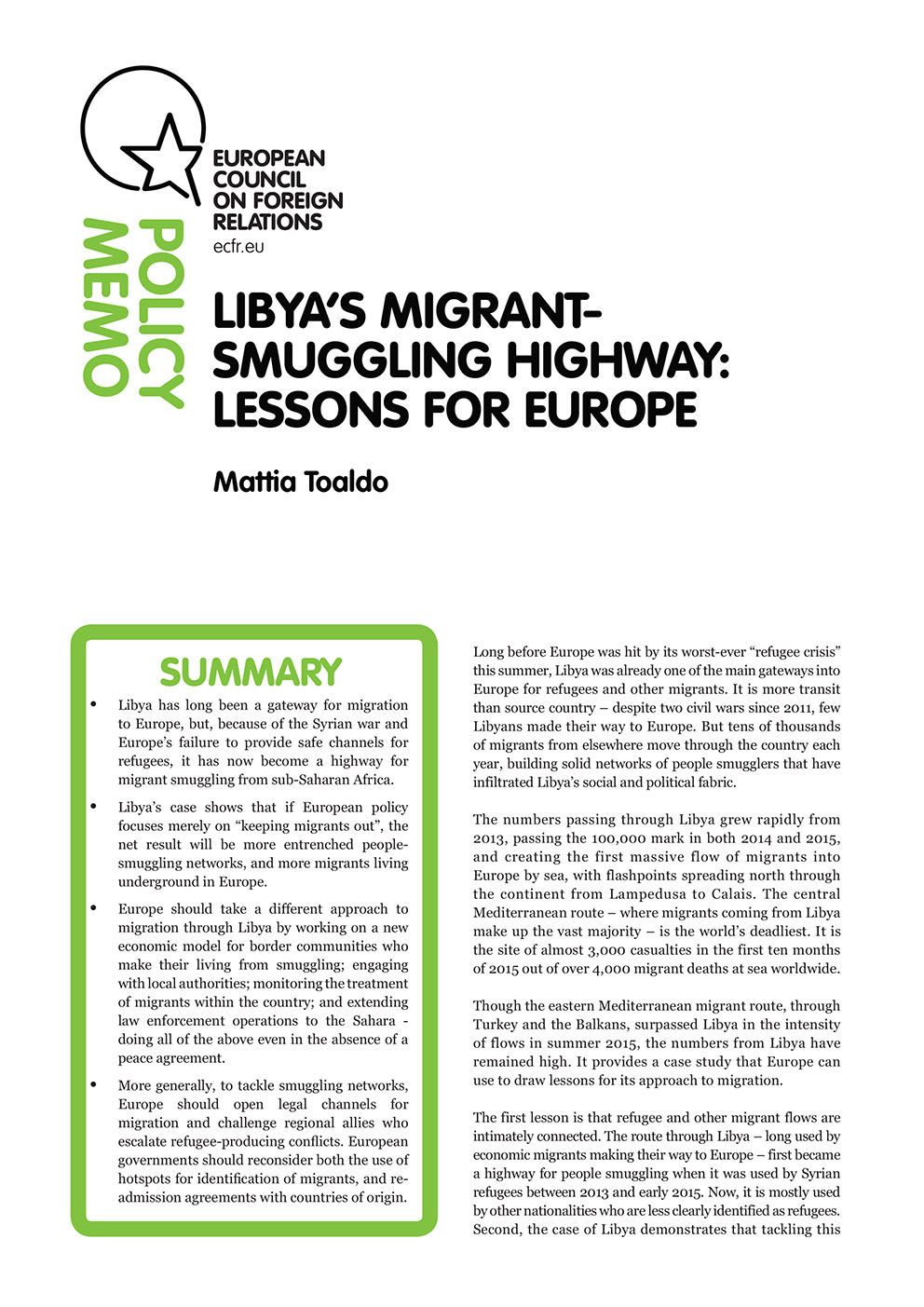Libya’s migrant-smuggling highway: Lessons for Europe
How the lessons of Libya can help European policymakers respond to the wider migration crisis
“Tackling Libya’s migrant smuggling highway”, by ECFR Policy Fellow Mattia Toaldo, explores the lessons learned from Libya’s experience with migration and how they can be applied to Europe’s burgeoning migration crisis.
On Libya, Toaldo notes that while the eastern Mediterranean migrant route, through Turkey and the Balkans, has surpassed Libya in the intensity of flows in summer 2015, the numbers from Libya have remained high. And as the earliest emerging centre of migration in this current period of large-scale migration, he highlights the lessons that the Libyan experience has for European politicians grappling with the migration crisis more widely.
On Libya’s lessons for the wider migration crisis, Toaldo highlights:
- The need for legal channels to Europe Migrations through Libya demonstrate how supposedly “closed borders” help to feed people smuggling. Yet it would be politically unrealistic for most EU member states to simply open their borders to all comers. Nevertheless, the EU can test forms of limited “surgical” opening, to save lives and ensure protection of refugees while depriving smugglers of revenue.
- Reception centres and hotspots: Think again. Reception centres or hotspots are meant to simplify and enhance identification of migrants alongside protection of asylum seekers. However, in the current political climate in Europe, there is a risk that these could become “pushback” centres, and even graver concerns arise in relation to hotspots in countries with a record of human rights violations.
- Re-admission agreements: Handle with caution Returning illegal economic migrants to their home countries has become a top priority in Europe’s management of the crisis. But, in the absence of these reasonable legal avenues for migration this creates serious concerns: in terms of human rights violations, and the creation of perverse incentive for authorities to keep the number of attempted migrations high so that they will continue to receive payments.
- Challenge regional allies The Mediterranean crises (primarily in Syria and Libya) have seen Western allies in the wider Middle East and North Africa region play a role in escalating those conflicts or blocking peace processes. Trade and political ties with these allies have always been more important than challenging their behaviour in the region but now, in light of the refugee crisis, it may be time to revise that calculation.
On improving the situation in Libya, Toaldo recommends:
- Working with Libyans on a different economic model for border communities The EU and its member states should support the separation of the illegal trade in legal goods –petrol, tobacco, or subsidised products such as wheat and flour – from the more damaging businesses of smuggling people and illegal goods such as drugs and weapons in border communities
- Engaging with local communities and local authorities In many parts of Libya, local authorities are the only functioning institution and so the EU should continue a political dialogue with municipalities on capacity-building assistance as well as joint efforts against people smuggling, even without a national agreement.
- Engage with state institutions, including in Tripoli Since the de facto partition of Libya in summer 2014, the EU and its member states have adopted a policy of strict non-engagement with Tripoli, which is precluding strong relations with officials involved in immigration control, visas, border monitoring, or the interior ministry.
- Increase monitoring and international presence to protect human rights In the absence of an agreement for a national unity government based in Tripoli, the EU and its member states should support international and Libyan organisations that are working to monitor human rights violations on the ground.
- Engage in intensive mediation to support Tebu–Tuareg de-escalation Fighting between the Tebu and the Tuareg minorities in southern Libya is a fundamental push factor for migrations from that region and the EU should offer both mediation and monitoring mechanisms with a particular emphasis on borders and smuggling.
- Accompany political and economic strategies with a comprehensive law-enforcement strategy Libya and its foreign supporters cannot eschew a comprehensive law enforcement effort aimed at migrant smugglers and Europe should, on request of the Libyan authorities, deploy monitoring and law enforcement mechanisms to support them.
- Support Libyan national dialogue, but without illusions The EU was right to support the UN-led political dialogue but an agreement seems far from being concluded. Europe should also make contingency plans on how to manage the migration crisis in Libya in the absence of an agreement.
The European Council on Foreign Relations does not take collective positions. ECFR publications only represent the views of their individual authors.



